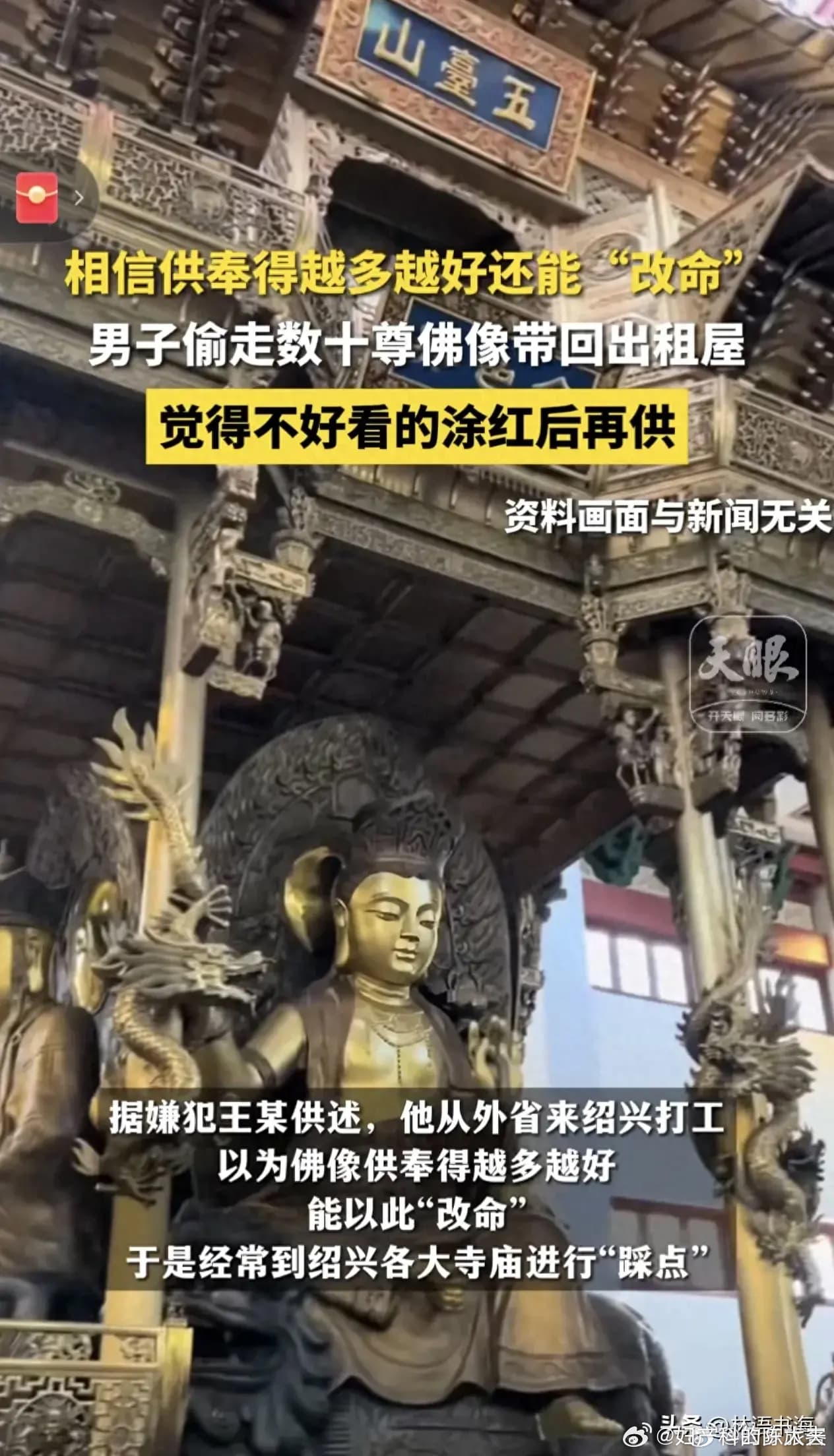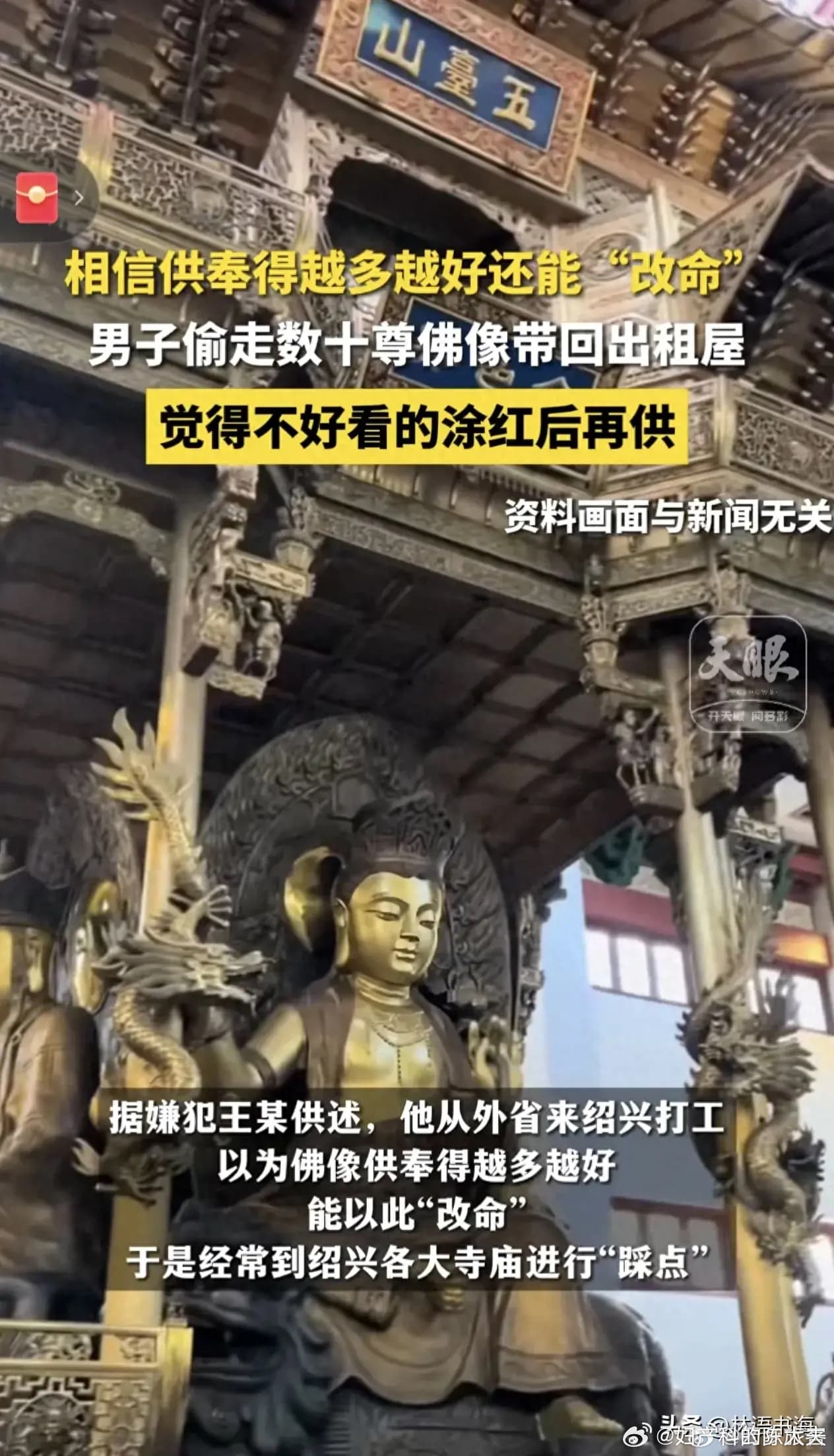Stealing Enlightenment: The Bizarre Case of the 21 Buddha Thief
The case of Wang, a 21-Buddha thief, has left many in the community bewildered. What drives a person to steal 21 statues of the Buddha, only to worship them at home? Is it a twisted form of devotion or a mere excuse for thievery? As we delve deeper into the mind of this suspect, it becomes apparent that a complex interplay of superstition and psychological quirks may be at play.

26 August 2024
According to his own admission, Wang believed that accumulating more Buddha statues would "change his fate" for the better. This obsession led him to scour various temples in Shaoxing, seeking out statues that were not being actively worshipped. He then took these statues back to his rental home, where he would clean them, repaint them red if needed, and offer them fruit, cakes, and incense.
Wang, a migrant worker from Sichuan Province, had been stealing and keeping the statues in his rental apartment for personal worship. He would often sneak into temples at night, targeting those that were unattended, and steal statues that he deemed worthy of worship. If he found a statue that he didn't think looked good enough, he would repaint it red, which he believed was a more auspicious color. The case was cracked after police received a report of missing statues from the Fangquan Shidang Temple, and an investigation led them to Wang's apartment, where they found the stolen statues arranged with offerings of fruit and incense.
Experts point out that this behavior is a classic example of the psychological phenomenon known as "magical thinking." Wang's actions were driven by a deep-seated desire to control his destiny, rather than a genuine sense of reverence for the Buddha. "It's a form of superstition, where the individual believes that by possessing these statues, they can manipulate their fate and achieve better fortune," explains Dr. Li, a psychologist from the University of Shaoxing.
Wang's actions also raise questions about the nature of faith and worship. Is it possible to worship an object in good faith, even if it was acquired through ill-gotten means? Can one truly believe in the spiritual value of a statue, while disregarding the harm caused by its theft? Wang's logic appears to be rooted in a twisted understanding of the concept of "Mehr Buddhism," or the idea that accumulating more Buddha statues and worshiping them would lead to a better life.
However, his methods have been widely criticized, with many online commenters expressing amusement and outrage at his actions. As one commenter quipped, "He thinks he can improve his fate by stealing Buddha statues? That's like trying to earn good karma by committing a crime!" Despite his misguided beliefs, Wang's actions have serious consequences. The 21 Buddha statues he stole are valued at a significant amount, and he will likely face severe punishment under the law.
As a result of his actions, Wang has been taken into custody by the Viet City Public Security Bureau on suspicion of theft. His behavior not only violated the law but also sparked widespread ridicule and questioning. Wang's case serves as a bizarre example of the complexities of human nature and the absurdity of superstition. The authorities have condemned Wang's actions, stating that his theft of the Buddha statues was not only a serious offense but also a desecration of the sacred objects.
The Viet City Public Security Bureau has vowed to crack down on such crimes and protect the cultural heritage of the region. Wang's punishment is likely to be severe, given the value of the stolen Buddha statues and the extent of his crimes. His case serves as a warning to others who would seek to exploit superstition and disregard the law for personal gain. In addition to facing legal consequences, Wang has also become the subject of ridicule and scorn on social media, with many netizens mocking his naivety and ignorance. His case has sparked a wider conversation about the dangers of superstition and the importance of respecting cultural heritage.
In conclusion, Wang's case will ultimately serve as a cautionary tale about the dangers of allowing superstition to cloud one's judgment. While his actions may be seen as a reprehensible form of thievery, they also highlight the complexities of the human psyche and the blurred lines between faith and delusion. As the investigation into Wang's crimes continues, it remains to be seen what further consequences he will face. One thing is certain, however: his actions will not be tolerated, and he will be held accountable for his crimes.

Comments






